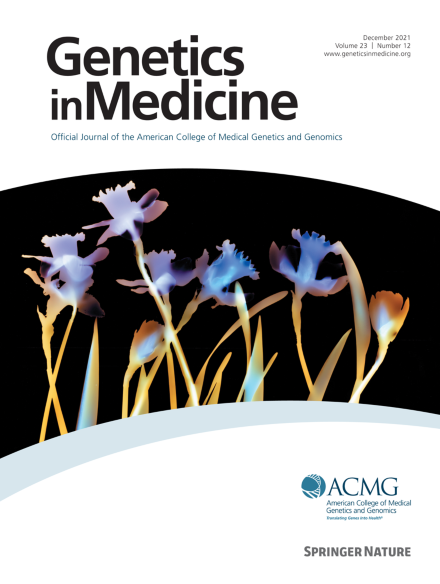拉丁美洲人基因检测意向的反思机构:确定携带者筛查和癌症易感性检测意向的预测因素。
IF 6.2
1区 医学
Q1 GENETICS & HEREDITY
引用次数: 0
摘要
目的:在基因检测的背景下,态度和临床过程已经得到很好的研究;然而,研究往往没有充分利用理论框架,尤其是在拉丁裔群体中。行为意向是行为吸收的一致预测因子,有许多理论基础。使用综合行为模型(IBM),我们对一个仅拉丁裔队列的携带者筛查(CS)和癌症易感性测试(CPT)的态度、规范和感知代理与行为意图之间的关系进行了建模。方法采用结构方程模型,分别建立测量模型和结构模型。初始测量模型对IBM的每个潜在变量(态度、规范和代理)及其指标使用验证性因素分析。因子负荷小于。500被移除,我们随后运行了一个结构模型,结果是打算使用CS和CPT。结果:代理是两种测试类型最一致的预测因子(β=。结论:在拉丁裔人群中,许多干预措施往往侧重于教育和态度的改变。我们的研究结果表明,应该做出更多的努力,以解决机构授权患者改善基因检测的途径。(197)。本文章由计算机程序翻译,如有差异,请以英文原文为准。
Rethinking agency for genetic testing intention among Latinos: Determining predictors of intention for carrier screening and cancer predisposition testing
Purpose
Attitudes and clinical processes have been well studied in genetic testing contexts; however, studies tend to underutilize theoretical frameworks, especially among Latino groups. Behavioral intention is a consistent predictor of uptake of behavior and has many theoretical roots. Using the Integrated Behavioral Model, we modeled the relationships between attitudes, norms, and perceived agency with behavioral intention for both carrier screening (CS) and cancer predisposition testing (CPT) for a Latino-only cohort.
Methods
Using structural equation modeling, we ran both measurement and structural models. An initial measurement model used confirmatory factor analysis for each latent variable (attitude, norms, and agency) and their indicators of the Integrated Behavioral Model. Factor loadings less than 0.50 were removed, and we subsequently ran a structural model with the outcome of intention to use CS and CPT.
Results
Agency was the most consistent predictor for both testing types (b = 0.381, P < .01 − CS; b = 0.559, P < .01 − CPT), with attitudes being negatively associated with CS (b = −0.313, P < .05), whereas norms were positively associated (b = 0.350, P < .01).
Conclusion
Many interventions among Latino groups tend to focus on education and attitude change. Our findings suggest that more effort should be made to address agency to empower patients for improved genetic testing access.
求助全文
通过发布文献求助,成功后即可免费获取论文全文。
去求助
来源期刊

Genetics in Medicine
医学-遗传学
CiteScore
15.20
自引率
6.80%
发文量
857
审稿时长
1.3 weeks
期刊介绍:
Genetics in Medicine (GIM) is the official journal of the American College of Medical Genetics and Genomics. The journal''s mission is to enhance the knowledge, understanding, and practice of medical genetics and genomics through publications in clinical and laboratory genetics and genomics, including ethical, legal, and social issues as well as public health.
GIM encourages research that combats racism, includes diverse populations and is written by authors from diverse and underrepresented backgrounds.
 求助内容:
求助内容: 应助结果提醒方式:
应助结果提醒方式:


